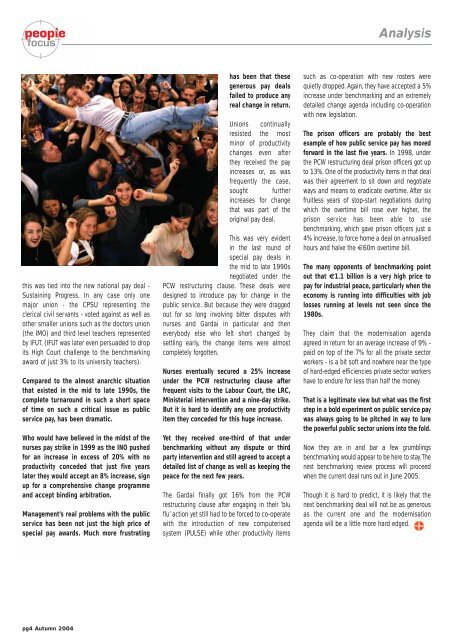People Focus Spring 04 NA - CIPD
People Focus Spring 04 NA - CIPD
People Focus Spring 04 NA - CIPD
- No tags were found...
You also want an ePaper? Increase the reach of your titles
YUMPU automatically turns print PDFs into web optimized ePapers that Google loves.
Analysisthis was tied into the new national pay deal -Sustaining Progress. In any case only onemajor union - the CPSU representing theclerical civil servants - voted against as well asother smaller unions such as the doctors union(the IMO) and third level teachers representedby IFUT. (IFUT was later even persuaded to dropits High Court challenge to the benchmarkingaward of just 3% to its university teachers).Compared to the almost anarchic situationthat existed in the mid to late 1990s, thecomplete turnaround in such a short spaceof time on such a critical issue as publicservice pay, has been dramatic.Who would have believed in the midst of thenurses pay strike in 1999 as the INO pushedfor an increase in excess of 20% with noproductivity conceded that just five yearslater they would accept an 8% increase, signup for a comprehensive change programmeand accept binding arbitration.Management’s real problems with the publicservice has been not just the high price ofspecial pay awards. Much more frustratinghas been that thesegenerous pay dealsfailed to produce anyreal change in return.Unions continuallyresisted the mostminor of productivitychanges even afterthey received the payincreases or, as wasfrequently the case,sought furtherincreases for changethat was part of theoriginal pay deal.This was very evidentin the last round ofspecial pay deals inthe mid to late 1990snegotiated under thePCW restructuring clause. These deals weredesigned to introduce pay for change in thepublic service. But because they were draggedout for so long involving bitter disputes withnurses and Gardai in particular and theneverybody else who felt short changed bysettling early, the change items were almostcompletely forgotten.Nurses eventually secured a 25% increaseunder the PCW restructuring clause afterfrequent visits to the Labour Court, the LRC,Ministerial intervention and a nine-day strike.But it is hard to identify any one productivityitem they conceded for this huge increase.Yet they received one-third of that underbenchmarking without any dispute or thirdparty intervention and still agreed to accept adetailed list of change as well as keeping thepeace for the next few years.The Gardai finally got 16% from the PCWrestructuring clause after engaging in their ‘bluflu’ action yet still had to be forced to co-operatewith the introduction of new computerisedsystem (PULSE) while other productivity itemssuch as co-operation with new rosters werequietly dropped.Again, they have accepted a 5%increase under benchmarking and an extremelydetailed change agenda including co-operationwith new legislation.The prison officers are probably the bestexample of how public service pay has movedforward in the last five years. In 1998, underthe PCW restructuring deal prison officers got upto 13%. One of the productivity items in that dealwas their agreement to sit down and negotiateways and means to eradicate overtime. After sixfruitless years of stop-start negotiations duringwhich the overtime bill rose ever higher, theprison service has been able to usebenchmarking, which gave prison officers just a4% increase, to force home a deal on annualisedhours and halve the €60m overtime bill.The many opponents of benchmarking pointout that €1.1 billion is a very high price topay for industrial peace, particularly when theeconomy is running into difficulties with joblosses running at levels not seen since the1980s.They claim that the modernisation agendaagreed in return for an average increase of 9% -paid on top of the 7% for all the private sectorworkers - is a bit soft and nowhere near the typeof hard-edged efficiencies private sector workershave to endure for less than half the money.That is a legitimate view but what was the firststep in a bold experiment on public service paywas always going to be pitched in way to lurethe powerful public sector unions into the fold.Now they are in and bar a few grumblingsbenchmarking would appear to be here to stay.Thenext benchmarking review process will proceedwhen the current deal runs out in June 2005.Though it is hard to predict, it is likely that thenext benchmarking deal will not be as generousas the current one and the modernisationagenda will be a little more hard edged.pg4 Autumn 20<strong>04</strong>
















